Rod Dreher's Blog, page 37
December 11, 2021
Zemmour: ‘Hands Off Notre-Dame De Paris!’
French presidential candidate Eric Zemmour — an unbelieving Jew — rushes to the defense of France’s unsurpassed Christian icon, the Cathedral of Notre-Dame de Paris. He has an op-ed in Le Point today about the proposed wreckovation of Notre-Dame de Paris. A reader translates it into English as follows:
Dear fellow patriots,
For months, a plan aiming to deconstruct the cathedral of Paris under the pretext of restoring it has been in the works. Yesterday, it entered its implementation phase.
As a lover of our civilization’s splendor, I cannot remain silent in the face of this appalling endeavor aiming to completely alter the world’s most visited structure, the center of gravity of French Christendom and the symbol of our nation.
The morning after the fire, what should Emmanuel Macron have decided to do? Have the cathedral rebuilt identically, on the inside as on the outside, and let the Historic Monuments commission accomplish its noble mission. In place of this, driven by madly uncalled-for pride, he launched a competition for modernizing the cathedral, and created an opaque structure led by a general—an expensive and extremely complicated project—intended to satisfy his whims.
The Notre Dame issue was then hidden under a seal of absolute secrecy. Until we learned that a new plan had been born, aiming to radically upend the cathedral’s interior. Emmanuel Macron is so pleased with it that he has invited its principal designer, a progressive priest with woolly fantasies, to the Elysee Palace. The president of the Republic is trying to pass off Notre Dame’s enthusiasts as backward-looking squares. But since when has modernity consisted of disfiguring an extraordinary masterpiece in order to replace it with an idiotic phantasm?
Two years on from the fire, our cathedral continues to perish, carried away by the flames of political correctness. “Emotional spaces,” “ecological chapel,” “journeys of initiation,” “abstract painting”: in a blaze of corny and imbecilic abstractions, wokeism’s demons are wreaking havoc on Paris’ most moving treasure.
The pilots of this project evince a skewed and perverted understanding of History. They see in Notre Dame a layer cake where each leader may leave his or her mark, “whatever the cost.” They take faithfulness for a lack of daring. There is one reason for all of this: they do not love France. They believe, as Emmanuel Macron says himself, that there is no French culture. They encourage everything that is able to deconstruct the heart of our civilization.
It is not yet too late to do the right thing. Emmanuel Macron must give the order to cancel this project, as quickly as possible. And, if by chance he persists in allowing the cathedral of Paris to be disfigured, when I am elected president I solemnly vow that Notre Dame will again become Notre Dame. I make this intention a permanent part of my campaign platform.
Long live our History, long live Art and, above all, long live France.
Here is a link to the French version:
Éric Zemmour : « Que Notre-Dame redevienne Notre-Dame » – Le Point
UPDATE: In case you missed it, and are wondering what the big deal is about Eric Zemmour, here is Christopher Caldwell’s terrific profile of the “deeply insightful and deeply disturbing” Zemmour.
The post Zemmour: ‘Hands Off Notre-Dame De Paris!’ appeared first on The American Conservative.
December 10, 2021
Gratitude For (Flawed) Religious Childhood
Every Friday I receivein my in-box The Galli Report, a newsletter sent out by retired Christianity Today editor Mark Galli, who converted to Catholicism. In today’s edition, he highlights a couple of pieces by two Anglicans who push back against Evangelicals, or Ex-vangelicals, who trash their religious roots.
One thing that I almost never see in the current Discourse about evangelicalism is an acknowledgement by people who were raised evangelical that their upbringing might have provided something, anything to be grateful for. When I hear people denouncing their evangelical or fundamentalist “family,” I remember something Auden said about Kierkegaard: “The Danish Lutheran Church may have been as worldly as Kierkegaard thought it was, but if it had not existed he would never have heard of the Gospels, in which he found the standards by which he condemned it.”
For decades now I have been puzzled, bemused, and sometimes frustrated by people who speak as though being raised a fundamentalist Christian is a uniquely terrible tribulation. And I have met many such people. I was not raised evangelical myself, and only in a nominal sense was I raised a Christian. We knew we were Baptists, because denomination was a social marker in Alabama sixty years ago, but we very rarely went to church. (Occasionally someone would feel a sense of responsibility and we’d attend for three or four weeks in a row, but then a year or more might pass before we returned.) We didn’t pray; I don’t believe I ever prayed or was prayed for at home. At some point in my childhood — during one of those brief spasms of church attendance, I suppose — I learned John 3:16, for which I’m very grateful! But I didn’t learn the Lord’s Prayer until I became interested in Christianity in college.
Jacobs goes on to talk about how his father, a violent drunk, was in and out of prison, and how his dad physically and emotionally abused him. He says:
So when people whose parents loved them and expressed that love, cared for them and prayed for them, encouraged them in goodness and consoled them when they were hurt, tell me that their upbringing was terrible because those same parents were legalists and fundamentalists, well … let’s just say that I have a somewhat different perspective.
Galli quotes from a great recent TAC piece by Brandon Meeks in which he expresses the same frustration with that kind of ungrateful person. Excerpts:
One can imagine fewer complaints from the South if her critics held everyone over the fiery pit like one of Edwards’s unfortunate spiders, and did so with equal contempt. But there seems to be a bit of socio-theological dissonance at play. On the one hand, cultures that are overtly pagan, unbelieving, or outright anti-god are viewed through the starry eye of Pelagian optimism. While on the other hand, the imperfect religious expressions of the Bible Belt are met with the clenched fist of an Augustinianism gone to seed. The latter is denounced as utterly depraved with all of the fervor of a tent-revivalist, while the former are patted on the head like some tame race of noble savages.
Just so, barring a faulty eschatology or kind of theological schizophrenia, one is left to draw the conclusion that those who dislike “Bible Belt Religion” really just dislike the Bible Belt. But for my part, I thank God for the Bible Belt people who introduced me to Jesus.
More:
Urban Evangelistas love to rail against nominal religion, declaring with no small amount of glee, “Mayberry is not the New Jerusalem.” To which an honest person is bound to say, “sure.” But then again, Mayberry sure as hell ain’t Sodom and Gomorrah either.
I was raised pretty much like Alan Jacobs was on the religious front (though thanks be to God mine was a loving family). My family were Easter and Christmas Methodists, with my father occasionally deciding that we needed to go to church for a few weeks, and then we would backslide. I can’t complain about the church in which I was raised, because we didn’t give them much of a chance to raise me. I complain about the lack of religion in my upbringing, but let me say something good about the nominal Christianity of my childhood.
My late sister and I were raised with the Christian story, in part because my mom took us to Sunday school. I was a shepherd in the Grace Episcopal Church kindergarten Christmas play. We kids processed into Jackson Hall carrying lanterns we made in kindergarten from milk cartons that had windows cut out of the side, and papered over with wax paper we had colored with Crayolas. I still remember all of us marching into the dimly lit hall, singing the mysterious “O Come, O Come Emmanuel,” enveloped by the warm smell of melting crayons coming from our glowing lanterns.
We never read the Bible at home, or prayed together, but the moral structure my parents instilled in me was quite Christian. I only began to realize that there was something wrong with our approach to the faith when I stumbled across a copy of The Late, Great Planet Earth at age 12, devoured it in one sitting, prayed the sinner’s prayer at 2:30 in the morning, accepted Jesus as my personal savior, and then sat back and waited for the Rapture.
I laugh at my adolescent Evangelical fervor, which was fairly short-lived, but I’m grateful that it compelled me to do something I had never done before: read the Bible in earnest. It opened a whole world to me. I fell away from it after a year or two, and then was nothing … until, at age 17, I walked blindly into the Chartres cathedral and met God. You know the rest of that story.
Over the years, I’ve been pretty critical of my folks over their attitude to church. Ruthie and I took different religious paths, but we were both regular churchgoers in our adulthood, unlike our parents. I can recall getting fed up from time to time with their complaining about the church, and telling them in anger that they ought to either change churches or get back in there and try to fix what they don’t like, but staying away from the house of God is not right. They had no idea what I was talking about. Eventually we quit arguing, because there was no point in it, and I realized I was sounding self-righteous. They never hassled me about church. My dad was hurt and offended that I left the Methodist Church to become Catholic, but not because I was becoming Catholic. He was grieved that I was no longer Methodist — this, even though he rarely went to church. It was part of the family’s identity, and to that I was being disloyal. But he got over his hurt, and always supported me, whether Catholic or Orthodox. His and Mama’s idea was, “Well, at least he’s going to church.”
When I first started reading about Moralistic Therapeutic Deism about fifteen years ago, I realized that this scourge had arisen because many Christians related to the faith the way we did in the 1970s: as part of our social identity rather than a living faith. A decade earlier in my Christian life, I would have been mad at my parents for what amounted to neglect. But by then, I was a father, and I realized how hard it is to raise children in the faith. Like so many people of their generation, at least down here in the Bible Belt, they assumed that we would always be Christian, and that nominal Christianity was just fine. They had no real understanding of how fluid our culture was becoming. Even today, I realized, so many Christians of my own generation don’t have a full grasp of what’s really happening. We are driving without lights at night, assuming that the guardrails are still in place on either side of the bridge.
For all I know, my own children will reach age 40, and wonder how on earth their parents were so lackadaisical about their religious upbringing, given the array of forces lined up against the faith in their generation. Or, if they remain Christian, but for whatever reason move to a different confession, I hope that they will remember fondly the Jesus that they were shown in Orthodoxy (the older two were baptized Catholic, but were little when we became Orthodox, so don’t remember Catholicism). When I was a Catholic, I met from time to time people who would introduce themselves to me as “recovering Catholics.” Often they would thank the God they no longer believed in for their Jesuit educations. I remember back then being really amazed, and even offended (as only a convert can be), how ungrateful these people were. Was there really nothing about growing up Catholic that they appreciated?
Anyway, in the spirit of Alan Jacobs and Brendan Meeks, I want to say how much I appreciate the good in my Christian raising. If my folks hadn’t given us what they did — Sunday school as little-bitties, Grace Church kindergarten, church at Christmas and Easter, and the rest. I might never have known or cared enough about God to be receptive to Him in the Chartres cathedral, and beyond. As nominal as the Christianity was in our household, the spirit of the Gospels still glowed there, and there is no telling how much good it all did for Ruthie and me. They say that a Christian’s feelings toward God often have a lot to do with how they related to their own father. As I wrote in How Dante Can Save Your Life, that really complicated matters for me, until by the grace of God things were untangled a few years back. But in the main, if that saying is true, then the fact that I came to believe in a morally rigorous but loving and kind Father in heaven has to do with the fact that Ray Dreher loved me well.
I would love to read a sweet thread here about what we appreciate from our flawed religious upbringings.
The post Gratitude For (Flawed) Religious Childhood appeared first on The American Conservative.
Liel Leibovitz Takes ‘The Turn’
If you aren’t checking in regularly with Tablet, you are missing one of the best magazines in this country. Today it features an essay by Liel Leibovitz, about how the insanity of the Left drove him — a lifelong progressive — out of the Left. He begins by talking about how all his life he was an unconflicted partisan of the Left. These were the Good People. These were his people. More:
I embraced my people, and my people embraced me. They gave me everything I had always imagined I wanted: a Ph.D. from an Ivy League university; a professorship at NYU, complete with a roomy office overlooking Washington Square Park; book deals; columns in smart little publications; invitations to the sort of soirees where you could find yourself seated next to Salman Rushdie or Susan Sontag or any number of the men and women you grew up reading and admiring. The list goes on. Life was good. I was grateful.
But then Leibovitz experienced The Turn:
If you’ve lived through it yourself, you know that The Turn doesn’t happen overnight, that it isn’t easily distilled into one dramatic breakdown moment, that it happens hazily and over time—first a twitch, then a few more, stretching into a gnawing discomfort and then, eventually, a sense of panic.
You may be among the increasing numbers of people going through The Turn right now. Having lived through the turmoil of the last half decade—through the years of MAGA and antifa and rampant identity politics and, most dramatically, the global turmoil caused by COVID-19—more and more of us feel absolutely and irreparably politically homeless. Instinctively, we looked to the Democratic Party, the only home we and our parents and their parents before them had ever known or seriously considered. But what we saw there—and in the newspapers we used to read, and in the schools whose admission letters once made us so proud—was terrifying. However we tried to explain what was happening on “the left,” it was hard to convince ourselves that it was right, or that it was something we still truly believed in. That is what The Turn is about.
You might be living through The Turn if you ever found yourself feeling like free speech should stay free even if it offended some group or individual but now can’t admit it at dinner with friends because you are afraid of being thought a bigot. You are living through The Turn if you have questions about public health policies—including the effects of lockdowns and school closures on the poor and most vulnerable in our society—but can’t ask them out loud because you know you’ll be labeled an anti-vaxxer. You are living through The Turn if you think that burning down towns and looting stores isn’t the best way to promote social justice, but feel you can’t say so because you know you’ll be called a white supremacist. You are living through The Turn if you seethed watching a terrorist organization attack the world’s only Jewish state, but seethed silently because your colleagues were all on Twitter and Facebook sharing celebrity memes about ending Israeli apartheid while having little interest in American kids dying on the streets because of failed policies. If you’ve felt yourself unable to speak your mind, if you have a queasy feeling that your friends might disown you if you shared your most intimately held concerns, if you are feeling a bit breathless and a bit hopeless and entirely unsure what on earth is going on, I am sorry to inform you that The Turn is upon you.
The Turn hit me just a beat before it did you, so I know just how awful it feels. It’s been years now, but I still remember the time a dear friend and mentor took me to lunch and warned me, sternly and without any of the warmth you’d extend to someone you truly loved, to watch what I said about Israel. I still remember how confusing and painful it felt to know that my beliefs—beliefs, mind you, that, until very recently, were so obvious and banal and widely held on the left that they were hardly considered beliefs at all—now labeled me an outcast. The Turn brings with it the sort of pain most of us don’t feel as adults; you’d have to go all the way back to junior high, maybe, to recall a stabbing sensation quite as deep and confounding as watching your friends all turn on you and decide that you’re not worthy of their affection any more. It’s the kind of primal rejection that is devastating precisely because it forces you to rethink everything, not only your convictions about the world but also your idea of yourself, your values, and your priorities. We all want to be embraced. We all want the men and women we consider most swell to approve of us and confirm that we, too, are good and great. We all want the love and the laurels; The Turn takes both away.
It doesn’t sound like Leibovitz became a conservative. He just became anti-woke. I get it.
To be fair, there are some nuts on the Right who would disfellowship you because you are insufficiently pro-Trump. But in general, you don’t have to worry about that sort of thing when you are in conservative circles. I’m generalizing, but right-wing people tend to think left-wingers are foolish; left-wingers tend to think that right-wing people are evil.
Don’t believe me? Look:
Add to the “why is everything liberal?” files. 41% of college Democrats wouldn’t shop at a business of the other side, 37% wouldn’t be friends with them, numbers for Republicans are 7% and 5%! Bad news if you dislike woke institutions, get used to it. https://t.co/rvGzSvKSZx pic.twitter.com/XrChVVPziH
— Richard Hanania (@RichardHanania) December 8, 2021
As longtime readers know, one of my oldest friends — a friend of forty years — severed our friendship earlier this year after she read a letter I wrote to the editor of the local paper supporting Sen. Bill Cassidy’s support for the second Trump impeachment (the one over his actions on January 6). She is a left-wing radical. After reading that letter, she said we could no longer be friends. I reminded her that I supported impeachment, and our Senator who voted for impeachment. Yes, she said, but you said that Donald Trump did some good things in office, and that is intolerable.
I realized then that this woman, a dear friend whom I love, would easily be Madame Defarge, quietly knitting and planning on the people who need to be dealt with in the event of a revolution. Who can do this? Who can end a human relationship of forty years over a slight deviation in political belief? (In fact, we hold very different political beliefs, but she was ghosting me because I thought that Trump, though deserving impeachment over January 6, had done some good things.)
I do not understand people like that. But I do understand that they exist, and that they hold a disproportionate amount of power in this country. One more quote from Leibovitz:
When “the left” becomes the party of wealthy elites and state security agencies who preach racial division, state censorship, contempt for ordinary citizens and for the U.S. Constitution, and telling people what to do and think at every turn, then that’s the side you are on, if you are “on the left”—those are the policies and beliefs you stand for and have to defend. It doesn’t matter what good people “on the left” believed and did 60 or 70 years ago. Those people are dead now, mostly. They don’t define “the left” anymore than Abraham Lincoln defines the modern-day Republican Party or Jimi Hendrix defines Nickelback.
So look at the list of things supported by the left and ask yourself: Is that me? If the answer is yes, great. You’ve found a home. If the answer is no, don’t let yourself be defined by an empty word. Get out. And once you’re out, don’t let anyone else define you, either. Not being a left-wing racist or police state fan doesn’t make you a white supremacist or a Trump worshipper, either. Only small children, machines, and religious fanatics think in binaries.
Hear, hear! I’m a man of the Right who doesn’t support some of the things that are popular on the Right. So what? It’s good to think for yourself. People who would end friendships with you over politics were never your friends to begin with. People who make you afraid to say what you really believe out of fear that you will be fired from your job or otherwise punished as a heretic are not your friends or your colleagues, but your enemies. These people are not liberals, but radicals. Better to be clear about that now. Live not by lies! It is better to suffer for the truth than to prosper in lies.
The post Liel Leibovitz Takes ‘The Turn’ appeared first on The American Conservative.
Trust In Military Collapsing
Is the U.S. military’s reputation in free fall? It sure looks that way.
The Ronald Reagan Institute just announced that public confidence in the military has continued its precipitous drop. The institute’s November 2021 poll found that only 45 percent of those polled report “a great deal of trust and confidence in the military” — down 25 points in three years. The institute adds “Increasing numbers of Americans say they have little or not much confidence in the military, which is up 15 points in the last three years.”
The military isn’t the only public institution suffering a bad reputation, but it is used to basking in public esteem. As a result, it may not know how to recover.
It would be interesting to poll the public to ask why people are losing confidence in the military. Absent those data, hazarding a guess would probably be projecting one’s own gripes onto the situation. My sense is that it has a lot to do with the chaotic Afghanistan withdrawal, because I am not sure how aware people are of the Afghanistan Papers, and what they revealed about how much the US military brass lied for years about the situation there. If more people did know about the Afghanistan Papers, then that would definitely suppress confidence. You can’t blame what’s there on Joe Biden, Donald Trump, or any president, not really. That’s all on the senior US military leadership.
You can blame Obama and Biden, as well as the senior US military leadership, for the institutionalization of wokeness in the armed forces — and you can blame Trump for not doing enough to stop the madness. Word is getting around about what they have done, and are doing, to military culture. The brass is making enemies of the core people who serve. Look at this graphic from the Council on Foreign Relations. Red states generally provide a disproportionate number of recruits:

Take a look at this 2020 story from The New York Times. It says:
The men and women who sign up overwhelmingly come from counties in the South and a scattering of communities at the gates of military bases like Colorado Springs, which sits next to Fort Carson and several Air Force installations, and where the tradition of military service is deeply ingrained.
More and more, new recruits are the children of old recruits. In 2019, 79 percent of Army recruits reported having a family member who served. For nearly 30 percent, it was a parent — a striking point in a nation where less than 1 percent of the population serves in the military.
For years, military leaders have been sounding the alarm over the growing gulf between communities that serve and those that do not, warning that relying on a small number of counties that reliably produce soldiers is unsustainable, particularly now amid escalating tensions with Iran.
To be sure, the idea of joining the military has lost much of its luster in nearly two decades of grinding war. The patriotic rush to enlist after the terrorist attacks of 2001 has faded. For a generation, enlisting has produced reliable hardship for troops and families, but nothing that resembles victory. But the military families who have borne nearly all of the burden, and are the most cleareyed about the risks of war, are still the Americans who are most likely to encourage their sons and daughters to join.
More:
The South, where the culture of military service runs deep and military installations are plentiful, produces 20 percent more recruits than would be expected, based on its youth population. The states in the Northeast, which have very few military bases and a lower percentage of veterans, produce 20 percent fewer.
See this map from the Times:
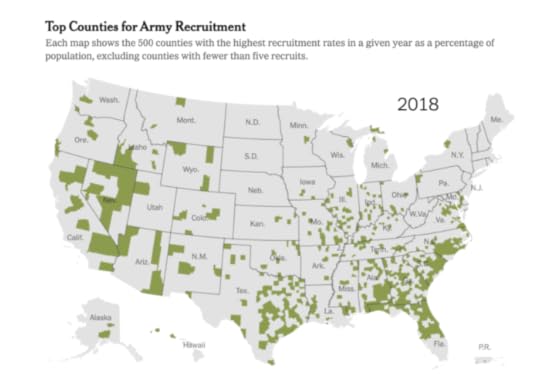
And:
The main predictors are not based on class or race. Army data show service spread mostly evenly through middle-class and “downscale” groups. Youth unemployment turns out not to be the prime factor. And the racial makeup of the force is more or less in line with that of young Americans as a whole, though African-Americans are slightly more likely to serve. Instead, the best predictor is a person’s familiarity with the military.
“Those who understand military life are more likely to consider it as a career option than those who do not,” said Kelli Bland, a spokeswoman for the Army’s Recruiting Command.
One more:
In Los Angeles, a region defined by liberal politics where many families are suspicious of the military, the Army has struggled to even gain access to high schools. By law, schools have to allow recruiters on campus once a semester, but administrators tightly control when and how recruiters can interact with students. Access is “very minimal,” said Lt. Col. Tameka Wilson, the commander of the Los Angeles Recruiting Battalion.
Predictably, enlistment rates are low.
In 2019 the Army made a push to increase recruiting efforts in 22 liberal-leaning cities like Los Angeles. As part of that, Army Secretary Ryan D. McCarthy visited officials from the Los Angeles Unified School District in December to push for greater access.
“He was doing a sort of listening tour,” said Patricia Heideman, who is in charge of high school instruction for the school district and said there was a perception the military preys on disadvantaged students. “I told him from the educator perspective, we sometimes feel they are targeting our black and brown students and students of poverty,” she said. And therefore they are less likely to push enlistment.
So many military people — active duty, or recently retired — I’ve met this year in my travels in the US, or who have written to me privately, tell me that they warn folks to stay away from the woke military. Obviously this is anecdotal, but I hear it so often that I believe it reflects a genuine larger trend. If you are conservative, or white, or religious, or some combination thereof, why would you want to put your life on the line to serve an institution whose leadership and whose policies hold you in contempt, or at least consider you to be a culturally backward heathen in need of conversion to wokeness? When my middle son, now 17, was enthusiastic last year about the military, I told him that service is honorable, and that I would support him whatever he decided, but that I did not want him to be in a position in which he had to disobey his conscience or disobey his commanding officer. He got it. He no longer plans on going into the military.
He would have made a good soldier. This is a boy who was educated in the Greek classics, and in Christian faith. I asked him why he wanted to serve. He said, “To do right by my country, to gain honor, to find brotherhood, and to have adventures.” Seriously, that’s what he said. This kid is alone in our family in having almost no sense of irony. He is all heart, and he is always the first to volunteer to help people in need, especially if there is hard physical labor involved. And yet, because he is a white male of generally conservative disposition, and because he is a devout Christian, I am increasingly convinced, by what I read and by what armed forces members, and recently retired armed forces members, tell me, that the US military would see a kid like him not as an asset, but as a problem.
I could be wrong. But you hear this over and over from people who are in a position to know, and it’s hard to conclude otherwise. I recently heard from a fairly prominent public person, a conservative Christian who said military service goes back generations in his family, on both sides. He served, but has strongly counseled his children not to serve. I can tell this both breaks his heart and infuriates him, because a tradition of military service was something he wanted to pass along. But he can’t do it, because he has lost confidence in our military, because of the poison of wokeness — ideological indoctrination — coming down from on high, and forced on the ranks. The Pentagon is politicizing our military, and he wants nothing to do with it for his children.
According to the Times story, a disproportionate number of recruits come from families like his. I have no idea how widespread this phenomenon is — I mean, patriarchs (and matriarchs?) of these families warning their children off the military — but if it is a real issue, or becomes one, we have a national security crisis created by the civilian and military leadership. This is a version of a foolish war of choice: a destructive thing that was not forced on us, but that our leaders chose to do.
In light of the Afghanistan Papers and our humiliating withdrawal, nobody in the Pentagon leadership has paid a price. Nobody in civilian leadership has made them. We are decadent. We may well be the late Ottoman Empire. Joe Biden’s Summit for Democracy is going to look utterly deluded if within two years both Taiwan and Ukraine are lost to the current world order and there is an increasingly ascendant and resilient competition to the West that doesn’t give a damn about our rhetoric or principles. The Ottoman Empire made great noise about being the absolute and total sovereign of the entire Ummah throughout its decline, but none of it mattered as Africa, the Indian Subcontinent, and Southeast Asia were all conquered and colonized by the European powers. The oligarchic technocratic progressivism has all the self-righteousness in the world but none of the actual willingness to fight. And it is demonizing and demoralizing the main population in this country that is willing to fight.
Even if the military were non-woke, I wouldn’t want my sons joining, because I do not trust the judgment of either the civilian or military leadership. We know from the Afghanistan Papers that the generals lie. Look at how the entire national security class in Washington, both liberal and conservative, are rushing towards conflict in Ukraine. Are they insane? This is the same leadership class that is presiding over the woke transformation of our armed forces.
Back in 2016, a reader of this blog was a Fulbright scholar, and sent to me photos of the handouts the State Department (which administers the program) gave his Fulbright class in their training session explaining how their task was to be cultural ambassadors for America. I wrote about it here. Excerpts:
The Fulbright scholarships are prestigious awards, funded by Congress, to hundreds of US academics and others to provide opportunities for study abroad. It is administered by the US State Department. A reader recently underwent a short course preparing incoming Fulbright scholars for their overseas deployment. He is going to study in a developing country. He tells me he was shocked by the instruction in gender ideology his group was put through as part of their briefing. They were instructed, he said to think about how they can be “an ally” to sexual minorities abroad.
He reports that his group sat through a speech about how backwards most foreign cultures are on sex and gender, and how they would all be ambassadors for cultural change in those benighted societies. Said the reader, “Any sensitivity toward differing cultural norms was couched entirely in pragmatic terms, relating, for example, to personal safety.”
He is a scholar with extensive experience living in the developing world, and this offended him. “The truly insane part, as I see it, is that this is a cultural exchange program. Ostensibly we are supposed to be fostering mutual understanding. [But] the message was clear: we are the tip of the spear of American cultural imperialism, and we are going to change these backwards traditional cultures whether they like it or not.”
Take a look at that post to see the two handouts. As I wrote back then (quoting a 2012 interview with an Obama administration official), this is all a deliberate decision the Obama State Department made to compel our diplomats — even at the level of Fulbright scholars — to become advocates of gay rights and gender ideology. Now the Pentagon is training our soldiers to be Social Justice Warriors, even to make war on themselves and their convictions if they don’t align with wokeness.
You have to ask: why exactly should non-woke veterans encourage their sons and daughters to put their lives on the line to serve an institution that will train them to hold their family traditions and moral and religious convictions in contempt? Moreover, why should these veterans encourage their children to serve a regime (= the ruling class) led by people who believe America’s role in the world is to spread values that demonize traditional Christians, and those who don’t share woke beliefs about race? These elites, including in the Pentagon, are making culture war on people like them at home, and simultaneously want them to send their kids to potentially make actual war on foreign people who are so backward that they don’t accept gender ideology and the rest of our decadent ideological package.
So, to recap: trust in the US military is collapsing. We don’t yet know why, but we need to find out. My supposition is that it has to do with some combination of the loss in Afghanistan, the lying that the senior leadership did for years about the situation in Afghanistan, and reaction to the senior leadership imposing wokeness on the armed forces. The military draws a disproportionate number of recruits from military families — and I have anecdotal evidence that some of these families are discouraging their kids from joining, because they believe from experience that, as one active-duty service member told me this fall, “this is not the same military that it was even two years ago” — this, a reference to the ideological program being shoved down their throats.
This is part of a broader culture war American elites are waging on segments of their own people. These are the same elites who are eager to wage culture war on foreign countries they consider to be insufficiently progressive on matters of sexual orientation and gender identity. Could it be that conservative American families are wondering why their sons and daughters should fight these foreigners on behalf of the same elite class that is waging culture war on them at home?
As J.D. Vance has said, once you realize the culture war is class war by other means, a lot becomes clear.
UPDATE: I want to be clear that I do believe that soldiers, sailors, and airmen should be expected to treat LGBT colleagues with respect. Whether it’s a good or a bad idea, the fact is that those men and women are in the military, and deserve respect. What I object to is the compulsory celebration, and the indoctrination with gender ideology. It is one thing to be taught respect for sexual minorities, but it is very much another to be forced to sign on to policies that compel religious and social conservatives in the ranks to not only respect their LGBT colleagues (a fair and sensible approach), but also to doubt and reject their religious and moral beliefs.
The post Trust In Military Collapsing appeared first on The American Conservative.
December 9, 2021
Jussie Smollett Guilty
Oh happy day! That creep Jussie Smollett, who claimed that he was attacked in a gay-bashing, was convicted today by a Chicago jury of five of six counts of lying about it:
Actor Jussie Smollett has been found guilty on five of six felony counts of disorderly conduct for making a false report to Chicago police that he was the victim of a hate crime in January 2019, an attack prosecutors said he staged.The jury of six men and six women deliberated for more than nine hours over Wednesday and Thursday.A disorderly conduct charge for a false crime report is a Class 4 felony and punishable by up to three years in prison and a $25,000 fine. Cook County Judge James Linn will have discretion in imposing a concurrent or consecutive sentence for each count at a later date.In 2019, when this all first happened, Facebook would not allow people to say what that Chicago jury found today was true. Facebook blocked people posting a commentary from me calling Smollett’s claims a hate hoax:
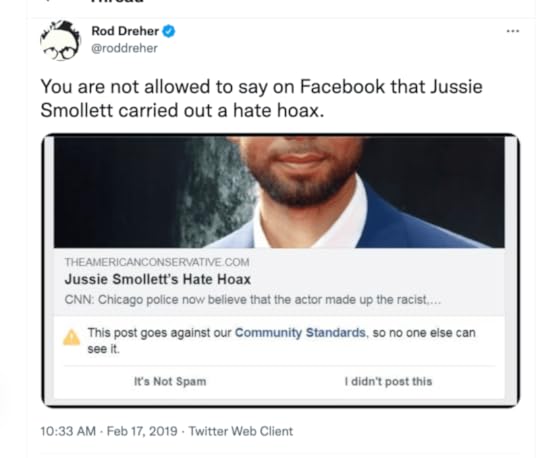
Let’s revisit some of what was said back in 2019 about the Smollett claim that he was brutalized by gay-bashers screaming, “This is MAGA country!”:
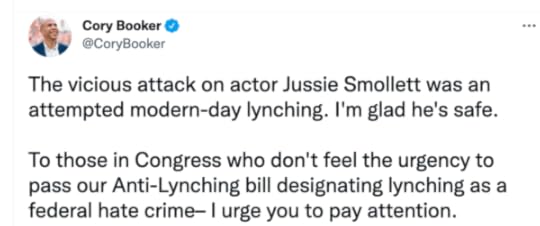
Here’s one from Nancy Pelosi; she deleted the original, but I captured the text on my 2019 post:

Don’t forget this one:

Washington Post reporter Eugene Scott wrote at the time not about Smollett’s “alleged” experience, but about the thing as if it were established fact:
Smollett’s experience is far too common for black gay men, particularly those who speak out against racism and sexism. As activist Preston Mitchum wrote:
“Everyday our multiple marginalized identities increase our chances of facing racist, homophobic vitriol — and this fact has only intensified under the Trump administration with their dog whistle politics. So as we wait to see if justice is served for Smollett, we as Black queer people wait to see if America will finally see our lives as worth protecting. Because history has rarely been on the side of Black queer folk.”
Because no black, gay man could possibly lie about being beaten up by thugs yelling, “This is MAGA country!”
Earlier this week, Black Lives Matter released the following statement:
The below is a statement from Dr. Melina Abdullah, Director of BLM Grassroots and Co-Founder of BLM Los Angeles, regarding the ongoing trial of Jussie Smollett:
As abolitionists, we approach situations of injustice with love and align ourselves with our community. Because we got us. So let’s be clear: we love everybody in our community. It’s not about a trial or a verdict decided in a white supremacist charade, it’s about how we treat our community when corrupt systems are working to devalue their lives. In an abolitionist society, this trial would not be taking place, and our communities would not have to fight and suffer to prove our worth. Instead, we find ourselves, once again, being forced to put our lives and our value in the hands of judges and juries operating in a system that is designed to oppress us, while continuing to face a corrupt and violent police department, which has proven time and again to have no respect for our lives.
In our commitment to abolition, we can never believe police, especially the Chicago Police Department (CPD) over Jussie Smollett, a Black man who has been courageously present, visible, and vocal in the struggle for Black freedom. While policing at-large is an irredeemable institution, CPD is notorious for its long and deep history of corruption, racism, and brutality. From the murders of Fred Hampton and Mark Clark, to the Burge tortures, to the murder of Laquan McDonald and subsequent cover-up, to the hundreds of others killed by Chicago police over the years and the thousands who survived abuse, Chicago police consistently demonstrate that they are among the worst of the worst. Police lie and Chicago police lie especially.
Black Lives Matter will continue to work towards the abolition of police and every unjust system. We will continue to love and protect one another, and wrap our arms around those who do the work to usher in Black freedom and, by extension, freedom for everyone else.
Frauds! Clowns! You BLM racists care nothing about the truth, only about loyalty to a narrative. Anybody who gives BLM money after this deserves to be laughed at as a fool.
While it is delightful to watch that faker get his comeuppance, we should not forget that hate hoaxes like this are designed to boost the hoaxer at the expense of making people believe that our society is full of violent bigots, and in turn causing more social mistrust and fear. I hope that in sentencing, the judge throws the book at this meat-beating fabulist:

What a lowlife. And now, a convicted felon.
UPDATE: Chef’s kiss to Ben Shapiro!
Tonight, Jussie Smollett can rest knowing that his attacker has been convicted.
— Ben Shapiro (@benshapiro) December 9, 2021
Oh, and this, from back in the day:

UPDATE.2: They keep coming!
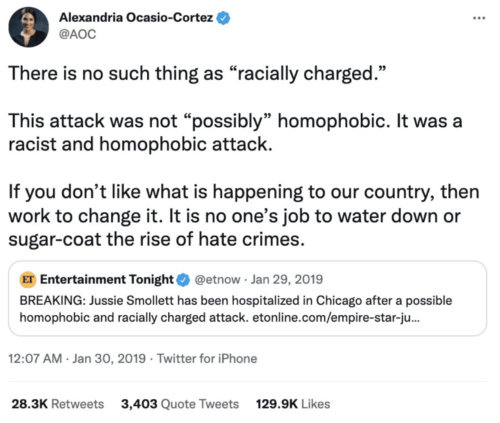


I bear glad tidings https://t.co/8QgvWPSxuU
— Ben Shapiro (@benshapiro) December 10, 2021
#JussieSmollett. From 6:54 mins. #BelieveAllWomen https://t.co/JKcQSIX3Eu
— Douglas Murray (@DouglasKMurray) December 10, 2021
The post Jussie Smollett Guilty appeared first on The American Conservative.
View From Your Table

I haven’t posted one of these in forever, but there was something about this one that James C. sent me that made me feel all cozy and wintry. James says this comes from a pub he visited in Bovey Tracey, Devon, England:
Venison and cranberry pie with mash, pickled cabbage, parsnips, carrots, broccoli and lots of gravy. At a very cosy 17th-century inn on the high street of this little town on the edge of Dartmoor, where I’m visiting some Catholic friends for the weekend.
It seems like everything about pubs, from their architecture and furnishings to their food and drink, seems to be designed to make you feel all warm and dry inside, at peace with the world, on a cold and wet December evening.
Amen, brother!
For the Advent and Christmas season, let’s bring back cozy Views From Your Table. Remember the rules:
The meal must be centered in the photoThe image must contain the meal in context; no photo of the dish alone, but a photo of the dish in a wider contextNo facesJames C. is the VFYT master. This photo above is a perfect example of the form.
The post View From Your Table appeared first on The American Conservative.
The Andrei Rublev Option
I commend to you Michael Anton’s searing essay in New Criterion, on the rapid disintegration of our civilization. His argument is that the degeneration of America today has no antecedents — not even imperial Rome. Excerpts:
Yet elite enthusiasms extend well beyond mere greed. There is a malice in them atypical to the native despot, one found historically only or largely among the most punitive conquerors. A tyrant fears a healthy population, to be sure, because such is always a threat to his power. This fear typically inspires little beyond efforts to ensure that the population is dependent and unarmed—two aims of our overlords, it need hardly be added.
Tyrants or ruling classes that despoil their countries for personal gain are nothing new.
But our elites also go much further. They seem determined to make the American population fat, weak, ugly, lethargic, drug-addled, screen-addicted, and hyper-sexualized, the men effeminate and the women masculine. Those last two actually barely scratch the surface of the agenda, which includes turning males into “females” and vice versa—or into any one of a potentially infinite number of “genders.” (The number varies depending on which source you check; sixty-three is the highest I could find. Needless to say, no establishment source stops at “two.”)
The regime promotes every imaginable historic form of degeneracy—and then invents new ones undreamt of by Caligula, the Borgias, or Catherine the Great. All these it pushes through every available media channel, social and legacy, in programming and advertising alike, even in books stocked in elementary-school libraries. As I write, the Virginia governor’s race is being roiled by the presence in said libraries of Gender Queer: A Memoir, an illustrated “children’s” book as sexually explicit as 1970s hardcore pornography—and arguably illegal to boot, since it depicts minors. One candidate for governor and his supporters indignantly insist that this kind of material must be forced on your kids at public expense and that only Nazis object. Degeneracy in tyrants is of course as old as the hills, but prior despots had the “decency,” if one could call it that, to restrict their perversions to the satisfaction of their own private pleasures. To force degeneracy on the whole of society, with the explicit intent of bringing the rest us to our knees, literally and figuratively—that, I think, has never happened before.
More:
We may tie these points together under the broad rubric of “education,” though that word is risibly inapt to what is “taught” today. The word’s root is Latin and means “to lead forth”—that is, to coax out of imperfect but improvable human nature that which makes each human being better. Or, as the classics understood it, not merely to impart knowledge but also to form character.
In both respects, our system does the opposite. It teaches lies, attacks and suppresses truth, and encourages people to behave worse. It tells children to hate themselves (or their classmates) because of their race and to hate their country. It encourages boys to declare themselves girls, and vice versa. It badgers kids into professing themselves attracted to members of the same sex, or of all sixty-three sexes, regardless of, or despite, their natural inclination. It firehoses them with sexualized messaging and imagery, always taking care to decouple orgasmic self-indulgence from love and family.
The people who run the system, or many of them, can only be described as sadists. How sick does one’s mind have to be to think it a good idea to teach a black kindergartner (through the taxpayer-financed public education system, no less) to hate his white classmates, or those white classmates to hate themselves? A sane society would call this child abuse.
The system now protects predators at the expense of the vulnerable and attacks parents who object. In Virginia, a boy in a skirt entered a girls’ bathroom and raped a student. The school and the district hushed it up and transferred him to another school—where he did it again. When one victim’s father complained at a school-board meeting, cops roughed him up and arrested him. The superintendent, principal, and all others in authority furiously denied that any assault had ever taken place—that is, except for the father’s impassioned plea, which the school board referred to the Attorney General of the United States, who then ordered the FBI and U.S. attorneys to investigate outspoken parents as “domestic terrorists.” This is not merely insane but deliberately evil. The Carthaginians cast living children into furnaces to satiate their (false) god Baal; we sacrifice our children’s mental heath and adult futures to appease our false god Woki. Plus ça change?
On the permanent woke revolution:
Finally, there is the endless insistence that every new dawn must begin a fresh Year Zero; we must start continually anew. What was acceptable yesterday is anathema today and will be more so tomorrow. All that came before must be swept aside and destroyed with extreme prejudice, on a rolling basis.
The most ferocious revolutionaries of yesteryear didn’t do this. The Jacobins changed the calendar and guillotined a lot of nobles but otherwise allowed France to remain French. The Bolsheviks did not touch the Russian literary or concert canons; to the contrary, they celebrated both. Mao made an attempt to start over—until the more sensible Party bosses realized that the old man (and especially his wife) had lost their minds and were destroying China, sidelined him, and quietly put an end to the Cultural Revolution four years before formally declaring mission accomplished. The Ayatollah did not ban Nowruz or other cornerstones of Persian tradition beloved by the Iranian people, but which predated his puritanical version of Islam.
Our overlords, by contrast, insist on changing everything and will not stop until everything familiar is gone. When this is pointed out, they smirk about the “slippery-slope fallacy” and gleefully lie. That will never happen, they say, until they insist on it, and, once accomplished, move on to the next target. They are cultural locusts devouring everything in their path. If the internal “logic” (if one may use that word in this context) of their passionate hatred is allowed to play out, no statue can be left standing, no traditional holiday observed, no name unchanged. If that outcome does not come to pass, it will not be because those driving toward it have a change of heart, nor is it likely to be because the Right suddenly becomes effective in opposition. It will rather be because the locusts destroy too many of the country’s remaining functioning parts too soon, causing the system to collapse before their program is complete, thereby making further “progress” impossible.
Read the whole thing. It’s important, and there’s much more that I didn’t quote. Anton says that any one of these things taken separately has historical precedent, but all of them happening at once? He doesn’t see it in the past.
Last night I had dinner with a tech industry friend in town on business. His work includes managing anti-porn software for families. He filled me in on what the scourge of pornography means.
He told me about a friend of his who worked this past summer at a camp for Evangelical high school kids. About one in five of the boys there, the man estimated, confessed that he suffers from erectile dysfunction — this, in a discussion about pornography. Can you imagine that?! One in five teenage boys — Evangelicals who care enough about their faith to attend a religious summer camp — cannot sustain an erection. This is entirely down to hardcore porn use. We are destroying the capacity of the next generation to love, to form relationships, and to form families. My friend said that most conservative parents want a tech silver bullet fix, but that’s not possible. You can use tech (like his company’s) to better the odds, but there will never be a perfect tech solution. We are going to have to use laws and technology to fight this evil, but there is no escaping the fact that we have to sustain a cultural change if we are going to survive this as a civilization.
It’s all horrible. But contemplating the Anton essay, I went back to this clip from the 1966 Soviet film Andrei Rublev, the masterpiece by Andrei Tarkovsky, who was a religious believer. The movie is Tarkovsky’s imaginative take on the life of the famous Russian medieval icon painter, of whose actual life we know almost nothing. It is a movie about art and suffering. In this scene, Andrei is grieving in the ruins of an Orthodox cathedral that has just been sacked by Tatars and their Russian allies. He is visited by the shade of Theophanes, his artistic mentor, who comes to him from beyond the grave to give counsel. Watch (it’s subtitled in English):
Andrei, shattered by what he has seen — mass murder, sacking, and even the destruction of all his work in the cathedral — and by his killing of a Russian who was assaulting a woman, says he will take a “vow of silence.” Not only will he never again speak, he also will no longer create icons. The suffering and wickedness of the world is too great. Theophanes gently suggests that this is a bad idea. The two men are standing in front of an iconostasis (icon screen) that has been burned by the barbarians, and Theophanes tells Andrei that the destruction might last forever.
Then, turning to an image of the Protecting Mother of God, the only iconic image on the wall that did not burn, Theophanes says, “Yet how beautiful all this is!”
They turn to look up at the broken dome of the cathedral, through which snowflakes have started to fall.

Theophanes says:
“Nothing is more terrible than snow falling in a temple.”
He utters those words while Tarkovsky’s camera focuses on Duroshka, a mentally challenged peasant girl, whom Andrei saved from being raped, resting in the ruins:
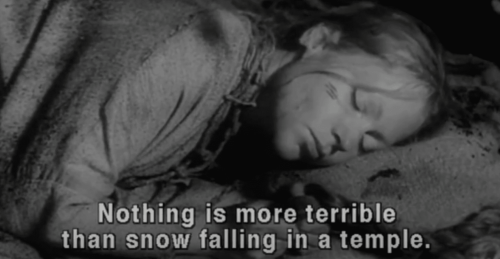
Then Andrei observes that the heavenly messenger is gone. Notice the one holy image remaining in the ruins, the way the light shines on it here:

What does this have to do with the Anton essay?
I believe that many of us are like Andrei, driven to his knees in the ruins of his world. Note well that for Orthodox Christians, the dome of a church represents the cosmos. The symbolism here is that Andrei’s own sense of cosmic order has been shattered by the wickedness of men. Yet Theophanes, who has gone to the next world, returns to tell him that violence and destruction is the way of the world … but there is still beauty in it. He’s gently telling Andrei that his role as an artist is to keep making beauty, and through beauty testifying to the Truth.
When Theophanes utters his line about snow in the temple, in the original Russian he means “terrible” in the sense of “awe-inspiring”. Why is it awe-inspiring to see snow falling in a temple? Because it means that there has been a terrible breach in the world, and a defilement of what is holy. Yet snow is light and lovely, and graceful. The fact that grace can come through the radical brokenness of the world is “terrible” in the sense of awe-inspiring. It is no accident that Tarkovsky focuses on Duroshka when Theophanes utters these words. She is, for Andrei, the snow that fell through the crack in the cosmos. He saved her from rape, and now he must care for her — and does. She is innocence. This vulnerable, weak, simple-minded girl is holy fool — a manifestation of Christ, and an opportunity for Andrei’s redemption. He cannot repair the world — but he can protect and care for this little one.
At the end of this scene, there are still two more chapters to be told in Andrei’s story. The ending is one of the most glorious things in the history of cinema. In it, Andrei is restored to spiritual health, and comes to recognize his role as an artist in bearing witness to Truth, Goodness, and Beauty amid the ruins of the world.
So, with that in mind, what is the Andrei Rublev Option?
It is to recognize that yes, we live in catastrophically destructive times. The barbarians are sacking the temple, so to speak. Yet beauty has not ceased to exist. God has not stopped speaking to us through beauty, and innocence. We behold the crack in the cosmos, but let’s not fail to see the snow falling through it — that is, the grace that comes to us through the tear in the fabric of the world. Let’s see those who are weak and vulnerable among us, and defend them, and care for them, so that those who would destroy their innocence do not succeed. The lesson of the movie (this comes beyond the scene in the sacked cathedral) is not to withdraw in despair, as tempting as that is, but rather to accept our mission to use the gifts God gave us to keep bearing witness to Him, because we never know what good that will do in lightening the burden of everyone struggling in the ruins, and how it might turn their hearts to the good.
This lesson is going to be a major part of my next book.
I am aware of only one other time in his work that Tarkovsky used snow falling in a temple. It comes at the end of Nostalghia (1983), a film that has changed the direction of my life. The protagonist of that film, a writer also named Andrei, struggles to create, not because he despairs of the world (like Andrei Rublev), but because he is fixated on nostalgia for what he left behind. He is in Italy to do research, but has been paralyzed because he is locked inside his own head. All he can think about is his family back in Russia. He is never fully present in the moment, and is blind to all the grace and beauty around him. At the very end, a sacrificial act for a suffering stranger draws Andrei out of his head, and into the real world. And it kills him. The final image shows Andrei inside the ruins of a church, one that has no roof, with snow falling in the temple. He has in some sense regained home, the image says, and the harmony that eluded him when he lived in time. This wordless scene is a cinematic icon of the terrible grace that came to Andrei through his sacrifice. It is a profoundly Christian image. It tells us that there is no greater love than to lay down one’s life for a friend, and that to lose your life for love is, in a mystical sense, to gain it.
Some people think my work is defeatist. They are wrong. I believe in fighting as hard as we can to defend what is good, true, and beautiful. But I also believe that what is happening now is the outworking of centuries of processes and forces that cannot be stopped, only survived. Politics has to play a role in this defense, but even an all-powerful sovereign, though he could perhaps stop the worst of it, would still be mostly like King Canute trying to roll back the sea. This is not a call to abandon politics. But it is a call to putting politics into perspective.
We live in a time that may be without precedent in its destructiveness, as Anton observes. Yes, there have been horrific periods in our civilization’s past history, but Anton points to the auto-demolition of our civilization today as being something unique. He may be right; I don’t know. What I do know is that whatever is and is to come, we who love Truth, Goodness, and Beauty have to keep the faith — and that means developing institutions and ways of life that are resilient in the face of this madness. I can’t speak about people of other faiths, but if you are a Christian, I strongly encourage you to find your way to a worshiping community that can read the signs of the times and has within it the strength to endure this apocalypse. “Conservative” is not enough. It is not remotely enough.
A modern Orthodox Jewish friend was telling me recently that his shul is filling up with Jews escaping “woke Judaism.” They aren’t necessarily Orthodox, but they just want to escape politicized religion. They never thought they would end up in a modern Orthodox shul, but there they are, and they are hungry to know more. May God bless them and give them shelter within living tradition!
The post The Andrei Rublev Option appeared first on The American Conservative.
Joe Biden’s Zombie Liberalism
Today the State Department launches a two-day Summit For Democracy, featuring the participation of 110 invited countries from around the world (but not Hungary, because even though Hungary is a democratic country, and a member of NATO, Hungary is Very, Very Bad ). The idea is to united world democracies to stand firm against “authoritarianism.” Golly. Here’s a fantastic essay by N.S. Lyons, from his can’t-miss newsletter The Upheaval, on how this is a phony exercise, given what the West has become in the pursuit of soft totalitarianism. Excerpts:
). The idea is to united world democracies to stand firm against “authoritarianism.” Golly. Here’s a fantastic essay by N.S. Lyons, from his can’t-miss newsletter The Upheaval, on how this is a phony exercise, given what the West has become in the pursuit of soft totalitarianism. Excerpts:
What we absolutely won’t see are any of the Western “liberal democracies” dare to stand up and commit to defend actual liberal principles themselves. Because liberalism in the West is dead.
Don’t believe me? Let’s go on a little holiday tour to examine which Western democracies are still upholding the core values of classical liberalism that their nations gave birth to during the great philosophical flowering of the Enlightenment.
For simplicity’s sake, let’s take as our measure a handful of the most important principles of this grand idea that was liberalism:
that individuals possess universal and inalienable natural rights;that “liberty of conscience is every man’s natural right” (as John Locke put it), and that freedom of religion is fundamental to a just and peaceable society;that freedom of expression is paramount, as free debate is inseparable from the process of government by reason, and to all human individual and social progress;that self-rule is the pinnacle of just and enlightened government, and that freedom of association and assembly is integral to political liberty;that the rights of the individual supersede the will of the collective, and all citizens are equal before the law;that there exists a necessary separation of the public and private spheres of life.So how closely does the West follow these liberal principles today?
Thus follows a quite shocking tour of actual conditions in Western countries. For example:
Britain now launches manhunts for 12-year-olds who allegedly send racist messages on social media, convicts teenagers of hate crimes for quoting rap lyrics in general circulation (fitting them with ankle monitoring bracelets for extra public safety), and jails people for offensive jokes. But the real innovation of the nation of George Orwell has been the invention of the “Non-Crime Hate Incident” – a brilliant category encompassing anything the police deem to potentially be offensive to someone, somewhere. That was the lesson learned by the unfortunate Harry Miller, whose 2019 tweets about gender were reported anonymously to police, who then quickly stormed into his workplace to “check his thinking.” Some 25,000 such incidents are now investigated by UK police each year, with each case filed in a permanent record that shows up in employment background checks even if no crime is ever prosecuted.
All of this is apparently still insufficient, however, as in October Prime Minister Boris Johnson threw his support behind new legislation, the Online Safety Bill, pledging to crack down even further on “hate speech” and “extremism” by imposing “criminal sanctions with tough sentences for those who are responsible for allowing this foul content to permeate the internet.” The bill may represent “state-backed censorship and monitoring on a scale never seen before in a liberal democracy,” as one free speech watch-group put it, but how can one argue with safety?
I assure you this is not the worst on the list. Many Americans have no idea how punitive other liberal democracies have become in policing “hate speech” against Sacred Victims. Read Lyons’s survey; it will shock you. As I write in Live Not By Lies, this soft totalitarianism is coming about for therapeutic reasons: to guarantee safety, comfort, and well being. This is not something that is going to happen someday; as Lyons details, this is something that is well underway right now. If we did not have the First Amendment in this country, people like Joe Biden would be eager to lead America towards the example set by the UK (especially Scotland), Germany, and other countries in the (checks notes) Free World. They would be very happy for America to replicate from sea to shining sea the left-wing illiberalism of many college campuses.
Here’s how Lyons ends his essay:
That old era of liberty, the Age of Liberalism, is over. The real reason Biden’s summit for liberal democracies will fail, why it will not accomplish anything in turning back the likes of authoritarian China, is because there no longer is any liberal West. Everywhere upon the face of the earth, Actually Existing Liberalism is now just oligarch technocratic progressivism wearing liberal principles as a skin suit and flirting with authoritarianism.
And if you can prove me wrong, if you can find me even one country still truly committed to liberal principles, please let me know – because I would like a visa.
Please read the whole thing. You need to know this. Take a look again at the list of fundamental liberal principles Lyons lays out, and ask yourself how well those principles are thriving in our “diverse, equitable, and inclusive” country. Subscribe to Lyons’s great newsletter. And don’t forget to #LiveNotByLies.
The post Joe Biden’s Zombie Liberalism appeared first on The American Conservative.
December 8, 2021
‘Forget Afghanistan, On To Ukraine!’
Let me say up front that I think Russia should keep its aggressive designs off of Ukraine. Putin should back down and leave the Ukrainians alone.
Let me also say, even more strongly: But so should NATO!
Back in the 1980s, when the Soviets were trying to establish a foothold in Nicaragua, the US, led by Ronald Reagan, said no, we will not permit that. This is in our own backyard. Soviet missiles placed so close to the US is an intolerable threat — just as we had done in the Cuban missile crisis. Even though Nicaragua was a sovereign nation led by a pro-communist government, it was an intolerable national security risk to allow that country to fall into the Soviet sphere of influence.
It’s the same way with Ukraine. No, actually it’s different. Ukraine is right on Russia’s border. The simile would be more accurate if the Sandinistas had gained control of Mexico, and were inviting the Soviets in. Look:
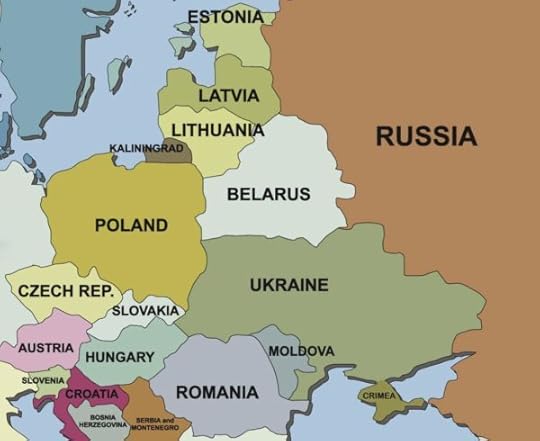
Again, I hate the way Putin has demonized the Ukraine patriots who want independence, but looking at it through a realist lens, I see no way that any Russian leader can allow Ukraine to become part of NATO. Besides which, unlike Nicaragua, Ukraine is historically an integral part of the Russian nation. It was the birthplace of Russian Christianity: the baptism of Prince Vladimir in 988 at Kiev was the beginning of the faith in the Russian lands.
Speaking not geographically but culturally, Ukraine is not, to Russia, as Nicaragua or Cuba is to the US. You might say it is closer to New England, or Texas, to the US — but in truth, there are no parallels. Ukraine is at the religious heart of the Russian nation, and has been for over 1,000 years.
This makes the cleavage between Ukraine and Russia a terrible tragedy, a fight between brothers. One can absolutely understand why the people of Ukraine hate the Russians, given what Stalin did to them. Nothing I say here should be taken as defending the way the Russians have historically treated Ukraine, or the way Moscow is treating them now. I hope and pray that this family feud will be healed.
That said, America, and NATO, should not make this worse. I think the best we and the Ukrainians can hope for is the Finlandization of Ukraine. I see no realistic sense in which Russia can allow Ukraine to become part of NATO.
Tucker Carlson last night openly said the US has no business provoking Russia in this conflict. Watch this extraordinary clip. Thank God for his voice!
The Washington War Party, though, is likely bound and determined to make the Donbass safe for Pride parades.
It does not matter whether Vladimir Putin is a bad man or not. America has no business getting involved in provoking a war over Ukraine. It is not our business. Yet the No. 2 Republican on the Senate Armed Services Committee, Mississippi’s Roger Wicker, actually suggested the possibility of using US nuclear weapons to defend an independent nation that has been part of Russia for many centuries, and was part of the Soviet Union until only thirty years ago.
The madness is bipartisan, as Tucker points out. These Washington warmongers are a scourge. I feel very sorry for the Ukrainians, so close to Russia, but it is not America’s role in the world to defend Ukraine, or to provoke Russia. And, after the humiliating loss in Afghanistan, what in the world makes Washington think the American people are eager to pick a fight with Russia?
The post ‘Forget Afghanistan, On To Ukraine!’ appeared first on The American Conservative.
Queer Santa As A Condensed Symbol Of Progressivism
A commercial for the Norwegian postal service shows Santa Claus getting a boyfriend:
There is nothing that these cultural revolutionaries will not make serve their revolution. No precious cultural tradition. This is what it means to “queer” everything: to turn it upside down, and to introduce sexual desire into everything. To enchant the world by imbuing everything in it with queerness.
Now the children of Norway have queer Santa. Why? What’s the point of bringing the culture war to children’s Christmas traditions? It’s because they — LGBTs and their straight allies — cannot allow any territory to go uncontested. There can be no neutral ground. All things must be infused with revolutionary order. This is a manifestation of soft totalitarianism. From Live Not By Lies:
One of contemporary progressivism’s commonly used phrases—the personal is political—captures the
totalitarian spirit, which seeks to infuse all aspects of life with political consciousness. Indeed, the Left pushes its ideology ever deeper into the personal realm, leaving fewer and fewer areas of daily life uncontested. This, warned Arendt, is a sign that a society is ripening for totalitarianism, because that is what totalitarianism essentially is: the politicization of everything.
Infusing every aspect of life with ideology was a standard aspect of Soviet totalitarianism. Early in the Stalin era, N. V. Krylenko, a Soviet commissar (political officer), steamrolled over chess players who wanted to keep politics out of the game.
“We must finish once and for all with the neutrality of chess,” he said. “We must condemn once and for all the formula ‘chess for the sake of chess,’ like the formula ‘art for art’s sake.’ We must organize shockbrigades of chess-players, and begin immediate realization of a Five-Year Plan for chess.”
The reader who sent this to me says it’s one more reason why he wants to “check out” of this civilization. He wants nothing to do with a civilization that queers Santa Claus, and calls it progress. I get that. What is there to defend? We in the West are ruled by people who hate its traditions, hate its ancestral religion, hate its history, and hate many of the people who live within it. They are infusing their ideology of racial hatred and queerness into everything they can, even, as we have seen, the military. Our kids are bombarded with gender theory in classrooms, trying to alienate them from their bodies, and even from their own parents, whose authority activist teachers are intending to subvert.
I won’t go into the long list here, because you regular readers have heard it all before. This is just a reminder that the culture war is something the Left wages on all settled traditions, on anything sacred (even “sacred” secular traditions, like Santa). Now, in Berlin, they’ve gone after the Virgin Mary. The model is the European Union’s “special ambassador” to the LGBT community:

From the same issue of the magazine:

This is sacrilege. They — the ruling class — hate us. They really hate us. These two queer Christmas things — the Norwegian commercial and the German magazine — appear now in Europe, but you know good and well that Europe only beat us Americans to it.
I wonder for how long moderate and moderately conservative Americans will be “Good Mainline Protestants” of the sort who tolerated every new outrage within their church, saying, “If the liberals here cross one more line, I’m out the door” — but that line keeps getting crossed, and nothing changes? That is, how much longer are people in the middle and on the right — and even faithful Christians on the left — going to keep tolerating things like this, and accepting it either as Progress, or as something that we just have to live with? Where is our self-respect? Where is our sense of right and wrong, of dignity?
We just let these people, these elites who run this regime (= media, education, corporations, the military, government) crap on us over and over, and tell us that in the name of Righteousness we have to accept things like a strong young man claiming to be a woman, beating women’s swimmers in competition, and if we don’t, we are horrible bigots who deserve to be repressed?
How much longer will we tolerate being shat on by elites who tell us that our religion is garbage, and needs to be queered, that our civic traditions are garbage, that the traditional family is garbage, that maleness and femaleness are garbage, that the nation is garbage, and even that people of certain races are garbage?
How are we going to hold America together? How are we going to hold the West together?
Should it be held together? Who wants to risk their lives, or the lives of their children, to defend the kind of country and civilization we are becoming? Y’all want to queer Christmas, be my guest. Y’all serve the false gods of the progressive pantheon. As for me and my house, we will serve the Lord.If that means persecution, well, bring it: I would rather suffer for the Truth than to bend the knee to your lies, provocations, and blasphemies — and I stand with my African, Latino, and Asian brothers and sisters in Christ on this.
Good luck defending this country from its enemies. I hope and pray that none of my children go into the woke Armed Forces, and get sent overseas to fight for this corrupt Empire. Alasdair MacIntyre’s final paragraph of After Virtue inspired The Benedict Option — and is more valid today than it ever was:
“It is always dangerous to draw too precise parallels between one historical period and another; and among the most misleading of such parallels are those which have been drawn between our own age in Europe and North America and the epoch in which the Roman empire declined into the Dark Ages. Nonetheless certain parallels there are. A crucial turning point in that earlier history occurred when men and women of good will turned aside from the task of shoring up the Roman imperium and ceased to identify the continuation of civility and moral community with the maintenance of that imperium. What they set themselves to achieve instead–often not recognizing fully what they were doing–was the construction of new forms of community within which the moral life could be sustained so that both morality and civility might survive the coming ages of barbarism and darkness. If my account of our moral condition, we ought also to conclude that for some time now we too have reached that turning point. What matters at this stage is the construction of local forms of community within which civility and the intellectual and moral life can be sustained through the new dark ages which are already upon us. And if the tradition of the virtues was able to survive the horrors of the last dark ages, we are not entirely without grounds for hope. This time, however, the barbarians are not waiting beyond the frontiers; they have already been governing us for quite some time. And it is our lack of consciousness of this that constitutes part of our predicament. We are waiting not for a Godot, but for another–doubtless very different–St. Benedict.”
The reader who sent me the queer Santa Claus commercial said, in effect, that he is turning aside from the task of shoring up the American imperium and is ceasing to identify the continuation of civility and moral community with the maintenance of that imperium. Queer Santa wasn’t the trigger, but it is a condensed symbol of so much he despises about what we have become. This man was a refugee from the Big Lie of Soviet communism, which conquered his native land and drove him out. Now, for the second time in his life, he feels like an alien in his own country.
What is a condensed symbol? Reader Raskolnik wrote this about it on this blog years ago:
Back in the 60’s, the sociologist Mary Douglas came up with the idea of a “condensed symbol.” The idea is that certain practices or ideas can become a kind of shorthand for a whole worldview. She used the example of fasting on Fridays, which the Bog Irish (generally lowerclass Irish Catholics living in England) persisted in doing, despite the fact that their better-educated, generally-upperclass clergy kept telling them to give to the poor or do something else that better fit with secular humanist mores instead. Her point was that the Bog Irish kept fasting, not due to obdurate traditionalism, or some misplaced faith in the “magical” effectiveness of the practice, but because it functioned as a “condensed symbol”: fasting on Fridays was a shorthand way of signifying connection to the past, to one’s identity as Irish, as well as to a less secularized (or completely non-secular) vision of what religious practice was all about. It acquired an outsized importance because it connected systems of meaning.
A further explanation:
A condensation symbol is “a name, word, phrase, or maxim which stirs vivid impressions involving the listener’s most basic values and readies the listener for action,” as defined by political scientist Doris Graber. Short words or phrases such as “my country,” “old glory” “American Dream,” “family values,” are all condensation symbols because they conjure a specific image within the listener and carry “intense emotional and effective power.” Often used to further the meaning of a symbol or phrase, the condensation symbol has a semantic meaning, but through long-term use, it has acquired other connotations that further its symbolic meaning. Doris Graber identified three main characteristics of condensation symbols, as they: (1) Have the tendency to evoke rich and vivid images in an audience. (2) Possess the capacity to arouse emotions. (3) Supply instant categorizations and evaluations.
We all know exactly what Queer Santa means: it symbolizes an entire worldview. We know what Trans Virgin Mary means: it symbolizes an entire worldview. It is the worldview of the ruling class throughout the West, one that rejects and even mocks all traditional norms, and seeks to eradicate them from public and private life. My liberal readers are going to roll their eyes and say Dreher’s hair is on fire over a mere TV commercial, and a gay magazine from Berlin. More discerning readers will know that I object to these things as condensed symbols of the entire progressive worldview — a worldview that is hysterically intolerant, and that makes war on social and religious conservatives at every opportunity.
As Viktor Orban said this week about the takeover of government in Germany by the Left: “We now prepare for battle with our eyes wide open.” He is talking about Hungary’s fight with the EU’s dominant left-wing. It is also true for us, in our own conflicts here in America. The fight parents in Virginia waged against the stealth attempts by school officials to infuse the curriculum with Critical Race Theory laid bare one aspect of the battle, and why it must be undertaken with eyes wide open. Parents can no longer take trust in school authorities for granted — and, as Abigail Shrier revealed in her recent reporting, in some places teachers and school officials are actively trying to undermine parental authority over their children, so the kids can be queered.
We have gone so far beyond “tolerance” that the claims and arguments of fifteen, twenty years ago might as well have occurred in the Dark Ages. Nobody wants this culture war, but this war has come to us whether we consent or not. The other side holds all the institutional power in this country, and it has no intention of tolerating us. Remember this?

What do I have in common with these people? I wonder that more and more with each passing day.
UPDATE: I am about to go into the comments to approve them, and am wondering how many of them will be in the spirit of the Defense of Butthole-Licking, e.g., “Who’s to say that this is really wrong, as long as there’s consent?”
The post Queer Santa As A Condensed Symbol Of Progressivism appeared first on The American Conservative.
Rod Dreher's Blog
- Rod Dreher's profile
- 508 followers



